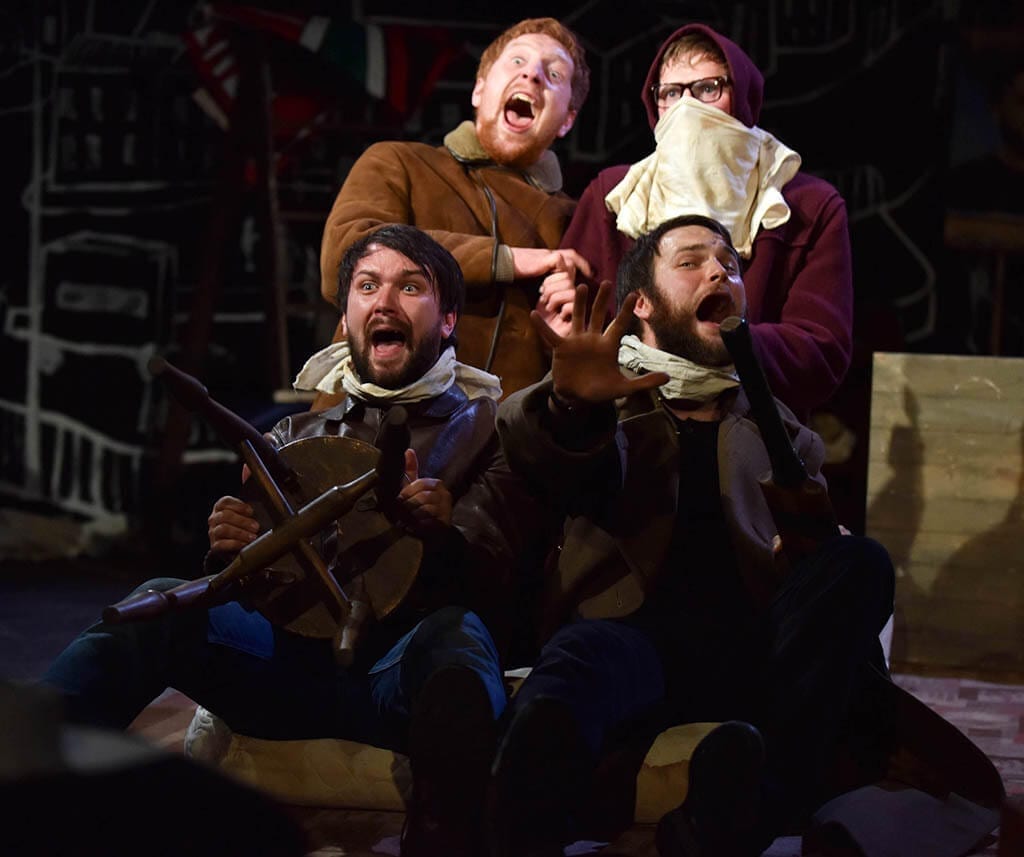David Halliwell’s 1965 play Little Malcolm and his Struggle against the Eunuchs draws heavily upon his own experience being expelled from art college in the late 1950’s, though he apparently always claimed that it wasn’t autobiographical.
Marking fifty years since it’s first original short run at The Unity Theatre in London where it was directed by Mike Leigh (and ran for almost six hours) and subsequent trimmed down transfer to the Garrick, (and then Broadway where it was retitled Hail Scrawdyke!) Southwark Playhouse have certainly spent both time and talent on showing this play to its best advantage, though I have to admit I still found it one of the most tedious evenings I’ve ever spent in the theatre.
The plot is perfunctorily simple. A lazy, self-centered, mouthy Northern egotist, Malcolm Scrawdyke, gets expelled from art college in Huddersfield (this is a play which is enthusiastically and ostentatiously Northern) and back in his freezing hovel as the new year dawns (we’re in the late 1950’s/early 1960’s) he plots world domination with his dim and easily led friends – whom he persuades to leave art college of their own volition to follow him – a process which they intend to start by executing revenge on the headmaster who expelled him. Think Hitler from about 1932 onwards…
In Act Two a woman only hitherto alluded to appears who exposes Malcolm as being all mouth and no trousers – and a virgin – and who, after trying to stop him from promulgating the stupid plan on his college principal, is beaten up by his co-conspirators.
Battered and bruised she somehow manages to make her escape and as the time to put the strategy into action arrives, Malcolm wimps out, finally exposing himself to his fellow bed-sit revolutionaries as the failure he undoubtedly is. He considers suicide but sadly decides against it in favour of exiting to try and apologise to the poor woman who wanted to stop him making a fool of himself.
The fact that I give the production any stars at all is because the play is not only very well directed by Clive Judd, but the cast, especially the central Daniel Easton, looking for all his beard and attitude like a young Chris Pratt, as the titular Malcolm Scrawdyke, are exceptionally good. Laurie Jamieson as Wick, who through his company Soggy Arts has a co-production credit, is always snappy, capturing his characters annoying quick-wittedness. Barney McElholm as the quieter Irwin is no less impressive, especially in his final showdown with Easton’s Malcolm after he realises what a charlatan he is. Scott Arthur as Nipple is refreshingly unsentimental in his portrayal of a young man who, like Scrawsyke, is a fantasist apt to think rather too highly of himself. And finally, Rochenda Sandall could have walked straight off the film set of A Taste of Honey, such is her period appeal, possibly thanks to Jemima Robinson whose design is highly evocative of both time and place, setting Scrawdyke’s lonely room against a backdrop heavily inspired by L.S.Lowry.
It can’t be argued that some of the dialogue is snappy, funny even, and an audience which I can only presume must have consisted heavily of friends and family laughed at some, if not all of the jokes delivered by this top notch, well directed cast.
All the laughter from here to Huddersfield though can’t disguise the fact that the play is waffly, rambling, and heinously self-indulgent. The characters are thoroughly unpleasant and dislikeable, with the exception of the one female, Ann, who arrives far too late to save proceedings. If you were to cut an hour (and at 2 hours 57, with interval, it needs it) reorder the material, and rewrite the worst and most purple passages, it would still barely possess the artistic merit of a telephone directory.
As Scrawdyke says in Act Two ‘It’s one long wank from beginning to end’. For once I was wholly in agreement with him.



